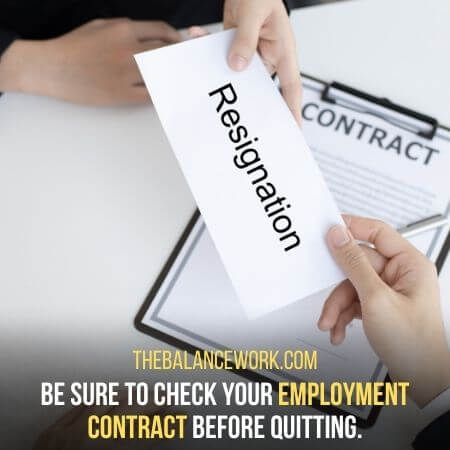“I’m thinking about leaving my job, but my boss won’t let me quit. Should I just leave without telling anyone? How bad would that be?”
Before making a decision, think about the good and bad outcomes.
Key Takeaways:
1. Consider the good and bad outcomes before deciding to quit your job.
2. If you need to quit without notice, try to keep your cool and be professional.
3. Giving proper notice (usually two weeks) is important to maintain a positive relationship with your employer.
4. Be polite and professional when quitting, thanking your boss for the opportunity.
5. Have a plan for what comes next after quitting, such as finding a new job or starting your own business.
6. Understand the potential consequences of quitting without notice, including potential damage to your professional reputation.
7. Check your employment contract for any rules about quitting without notice.
8. Complete any unfinished tasks and gather necessary information before leaving your job.
9. Quit in person if possible, and maintain a positive attitude about your decision.
10. Be firm in your decision to leave if your boss tries to convince you to stay.
11. Consider why your boss may not want you to quit, such as concerns about losing money or looking bad.
12. Your boss usually cannot sue you for quitting your job, except in certain circumstances.
13. Human resources (HR) may be able to help mediate the situation if your boss is being difficult.
14. Ultimately, the decision to quit is yours, and you should choose what is best for you.
My Boss Won’t Let Me Quit – Now What?
You might be very unhappy at work and want to leave right away.
But you might also be worried about what could happen if you quit without telling your boss first.
This could hurt your professional reputation or make people at your current job dislike you.
If you need to quit without notice, there are some things you can do to make things go smoother.
1. Keep Your Cool:
Try to stay calm and don’t get upset, even though it’s hard. Take a deep breath and think before you do anything.
It might feel good to quit right away, but it’s important to slow down and consider your options.

If you decide to quit, be professional.
You should avoid quitting in a way that would make things difficult for your boss or company.
2. Give Proper Notice:
It’s important to tell your boss you’re quitting before your last day, if you can. This is called giving notice.
Giving notice is like giving your boss a heads-up so they have time to find someone new for your job and make things easier for everyone.
The usual notice is two weeks, but sometimes more or less time is okay.
The most important thing is to not just quit without telling anyone. This makes things harder for everyone.
3. Be Professional & Polite When You Quit:
It’s important to be nice and respectful when you quit your job, no matter how much notice you give.
Leaving a job shouldn’t hurt your chances of getting future jobs, so be polite and professional.
Thank your boss for the chance to work there and let them know you appreciate their help.
If you need to quit, explain your reasons calmly and professionally. Even if they don’t want you to leave, don’t get aggressive.
Instead, try to remain calm and polite. This is the best way to maintain a positive relationship with your boss.
Let them know you understand their point of view, but you’ve decided to leave and want to keep things friendly.
4. Have A Plan:
It’s good to have a clear next step, whether you give notice or not. But it’s especially important if you leave without giving notice.
This could mean finding a new job, starting your own business, or taking some time off.
Having a plan will help you feel less stressed and worried about quitting your job.
5. Be Ready For The Consequences:
If you quit your job without telling your boss ahead of time, they might be upset.
It might also cause some problems for you later on. But if you need to quit this way, you have to accept these risks.
You will not be able to ask your boss to be a reference for future jobs if you quit without notice.
It could also hurt your relationship with them.
But, if you are polite and professional when you quit, the damage can be lessened.
Ultimately, you should do what is best for you. If quitting right away is the best choice, then do it.
Just think about the good and bad sides first, and be prepared for what might happen.
6. Check Employment Contract Rules For Quitting Without Notice:
Before you quit your job, it’s a good idea to check your contract. Some employers have rules about quitting without letting them know first.

If you don’t follow these rules, you could be subjected to legal action.
Here are some things your contract might say about quitting:
– You might need to give your employer a two-week notice.
– You might have to pay back any bonus money the company gave you when you started.
– You might need to keep working for a little while after you give notice.
7. Get Your Affairs In Order:
Before leaving your job, make sure everything is settled. This means taking care of unfinished business at work.
For example, you could help train the person who will take over your job. You could also try to complete any projects you haven’t finished yet.
Also, make sure you have all the important papers and information you need from your job.
This could include your contact details, your work history, and how much you were paid.
8. Quit In Person:
The best way to quit your job is to talk to your boss face-to-face. If that’s not possible, you can call them on the phone or send an email.
It’s not a good idea to quit by text message or social media. That’s not how grown-ups act in the working world.
9. Have A Positive Attitude:
It’s important to be happy and confident when you quit your job. You’re the boss of your own life, and you’re choosing what’s best for you.
Don’t let anyone else tell you how to feel about it.
To stay positive, be proud of yourself, and excited about what’s next. Don’t dwell on the past and focus on your future.
Remember, it’s okay to move on!
10. If Your Boss Doesn’t Accept Your Resignation:
If your boss tries to convince you to stay, listen politely but be firm.
Let them know you’ve decided to leave and their offer won’t change your mind.

Don’t be tempted by promises of raises or vacation days. Stick to your decision.
Remember, it’s your life and you have the right to choose what’s best for you.
Some Exceptional Cases:
Sometimes, your boss might have a better idea than quitting!
For instance, if you’re unhappy, they might be able to move you to a different job within the company that you might like more.
Also, if you’re moving, they might let you work from home so you can keep your job.
It’s good to hear their ideas before you decide to quit, but it’s always up to you in the end.
Why Doesn’t Your Boss Want You To Quit – Understand Them
Hold on before you decide to leave. It’s good to know why your boss wants you to stay.
There are a few reasons, but it probably has something to do with the company’s money.
Here are some common reasons why bosses don’t want employees to quit:
1. They Don’t Want To Lose Money:
Your boss doesn’t like spending money, and when you leave, it costs the company money.
They need to spend time and money finding someone new and teaching them their job.
All of this means your work might not get done as well, which could make the company lose customers and money.
2. They Don’t Want to Look Bad:
If you quit, it might reflect poorly on your boss. After all, they’re the ones who hired you.
And if you quit after a short period, it makes them look bad. It makes it seem like they can’t hold on to good employees.

And it makes them look like a poor leader.
3. They Don’t Want the Responsibility:
Your boss might be concerned about a few things if you leave:
- Finding and training someone new: This can be time-consuming and stressful.
- Extra work: They might have to take on your tasks while they search for a replacement.
- The burden of an empty position: They might feel the pressure to fill the position quickly.
4. They Don’t Want You to Leave:
Your boss might like you and enjoy working with you.
Your boss might be unhappy to lose you, but their main concern is the company’s success.
If your leaving is what’s best for the company, they’ll have to let you go.
These are just some reasons why your boss might not want you to quit.
But remember, ultimately the decision is yours. You should do what’s best for you, not your boss.
Can Your Boss Sue You For Quitting?
Your boss might threaten to sue you if you quit, but usually they can’t.

There are a few exceptions, like if you signed a special contract or if you take secret company information to start your own business.
But in most cases, your boss cannot sue you for quitting your job. So don’t let their threats scare you from doing what’s right for you.
Can HR Help You In This Case?
If your boss is being difficult, HR can help.
They can talk to your boss and you to find a solution that works for everyone.
They can even help you find a different job within the company if you need it.
So if you’re stuck in a bad situation, talk to HR. They can help you figure things out.
Conclusion:
Even if your boss doesn’t want you to leave, you can still quit your job.
You can give them a written notice saying you’ll quit in two weeks. Or, you can wait until you find a new job, then give your notice.
Ultimately, it’s your decision. You choose what’s best for you!
Last Updated on 1 year by Usama Ali
- Why Does My Boss Wink At Me? 6 Potential Reasons - October 5, 2023
- Is It Legal For Your Employer To Call Your Doctor? No, But… - October 4, 2023
- 12 Ways To Deal With A Low IQ Person - September 22, 2023